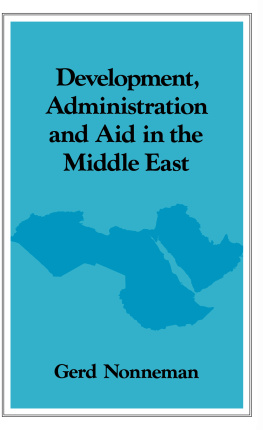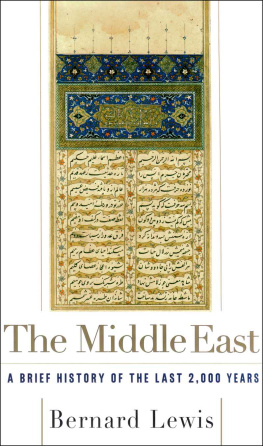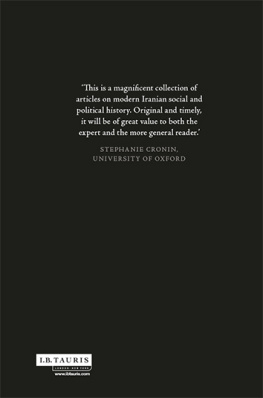DEVELOPMENT, ADMINISTRATION AND AID IN THE MIDDLE EAST
Development, Administration and Aid in the Middle East
Gerd Nonneman
First published 1988
by Routledge
2 Park Square, Milton Park, Abingdon, Oxon, OX14 4RN
270 Madison Ave, New York NY 10016
Transferred to Digital Printing 2007
1988 G. Nonneman
All rights reserved. No part of this book may be reprinted or reproduced or utilized in any form or by any electronic, mechanical, or other means, now known or hereafter invented, including photocopying and recording, or in any information storage or retrieval system, without permission in writing from the publishers.
British Library Cataloguing in Publication Data
Nonneman, Gerd
Development, administration and aid in
the Middle East.
1. Middle East. Economic conditions
I. Title
330.956052
ISBN 0-415-00104-8
Library of Congress Cataloging Publication Data
ISBN 0-415-00104-8
Cover designed by Alan Forster
Publisher's Note
The publisher has gone to great lengths to ensure the quality of this reprint but points out that some imperfections in the original may be apparent
Contents
| Figures |
| Tables |
| Middle Eastern Aid Recipients |
| Middle Eastern Donors |
For A A J Van Bilsen, mentor and source of inspiration
The present study started as the Middle Eastern part of a larger research project on the administration of development and aid, inspired and led by Prof. em. A.A.J. Van Bilsen, and based at Gent University (Belgium). Much of the research for this book was made possible by the sponsorship of the VLIR (Board of Flemish Universities). The aim was to present an up-to-date comparative overview of the subject, providing both data for reference, and analysis. This has been carried on in the present volume, which covers the Middle East and North Africa, including Ethiopia, but excluding Iran, Turkey, Lebanon and Palestine. Due to material constraints, Libya, Tunisia and Morocco could be covered only peripherally. In the course of our research, fieldwork was carried out between November 1985 and April 1986 in Egypt, Sudan, Ethiopia, Djibouti, the Yemen Arab Republic (Yemen AR), Saudi Arabia, Oman, the United Arab Emirates (UAE), Kuwait, Jordan and Syria. In addition we could draw on previous personal experience in the area, particularly Iraq.
The helping hands along the way were too many to list here my thanks to them are no less fulsome for it. Specific mention must be made, however, of Prof. Van Bilsen's untiring support and initiative; the contributions on Algeria by Gent University's Dirk Beke; and the assistance received from the Belgian diplomatic community in the Middle East. Regular contacts with Geert Laporte and Jean Bossuyt, at Gent University, kept the project going and morale high. The Abdalla and Gillespie families in Khartoum, Tsega Mintesnot in Addis Ababa, Tim MackintoshSmith in Sanaa, Johann Rattenstetter in Riyadh, Duncan and Christalla Kirby in Oman, Janet Seng in Abu Dhabi, and Jan and Mike James in Damascus all helped make my trip particularly enjoyable and affordable. Special thanks must also go to Mr. Ishaq Rashid, single-handedly running AFESD's Coordination Secretariat, for repeatedly providing me with comprehensive and up-to-date figures on the Arab development funds. Last but not least, the extensive and constructive criticism of Nazih Ayubi and Tim Niblock of Exeter University, has been invaluable. Unfortunately, I alone have to bear responsibility for any deficiencies which still remain.
Development administration and the administration of aid, as well as the antecedents, present state and future potential of the economy of countries studied, are, for all practical purposes, partly overlapping constituents of a complex whole that also encompasses politics in the broadest sense of the word. Each of these elements, therefore, will have to figure in the present study, although the focus will remain on the administration of development and aid. The framework might be called a political economy one, though without the ideological connotations which that term has carried.
In this work, 'the Middle East will be taken to mean the Arab world (with the exception of Palestine, and of Mauritania and Somalia) plus Ethiopia. The justification for the latter's inclusion is its geographical location and the interesting point of reference it provides as one of the only two Marxist states in the region. When the term 'Western Asia' or 'ECWA (Economic Commission for W.A.) region' is used, this covers the Arab countries except the Maghreb, Libya, Mauritania, Somalia, Sudan and Djibouti.
'Development' will be taken to mean any evolution in the social and economic fields, be this the result of market forces or of conscious policies. It includes any improvements in the general wellbeing of the people. 'Development administration', as distinct from 'public administration', has been defined in many ways, usually referring to organised efforts or a bureaucratic process to achieve socioeconomic progress (e.g. Garcia] has pointed out, however, such definitions are biased towards the positive achievement function, and implicitly discount the possibility of failure. Following Quah,
development administration refers to the administration of developmental programmes designed to promote nation-building and socioeconomic development and the concomitant development of administrative practices and institutions necessary for the implementation of such programmes [1979: 32].
The above definition is workable, with the proviso that the term 'nationbuilding' should also refer to considerations of legitimacy and regime survival: with that modification it will be adopted hereunder.
'Aid' will be denned for the purposes of this study as all nonmilitary financial, technical and commodity assistance of a concessionary nature. This definition will be amended when appropriate or necessary, e.g. when no breakdown is available. Since massive 'political' or military infusions of funds usually have economic implications, they also have to be covered. 'ODA' stands for 'official development asistance', as defined by the OECD's Development Assistance Committee (DAC).
The main question motivating and underlying studies such as the present one is always 'why is it so difficult for the Third World in casu the Middle East to achieve development?' In order to have any hope of finding an answer, one needs to enquire how that development has been tackled in those countries in the past and how it is today. Two major facets of this are, domestically, development administration, and, internationally, development aid. The aim of this study will therefore be to consider the past and present problems affecting those two. We will, thus, need to discuss (1) past and present trends and problems in the socioeconomic development of the region; (2) development administration, looking both at purely 'administrative' problems and at those with deeper roots; and (3) development aid and its administration.
In the majority of countries in this region the State has grown ever more powerful and important; State and Bureaucracy have come to play a large role in all aspects of development. For the administration of development and aid to be investigated fruitfully, therefore, it is necessary to examine more closely the role of the State and the function of the Bureaucracy (as 'embodiment' of the State) in a wider political economy framework. There is indeed little point in studying problems of a purely 'administrative' or 'technical' nature without placing them in the wider, national and international, politicoeconomic context that may be the main determinant.








